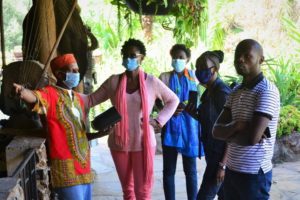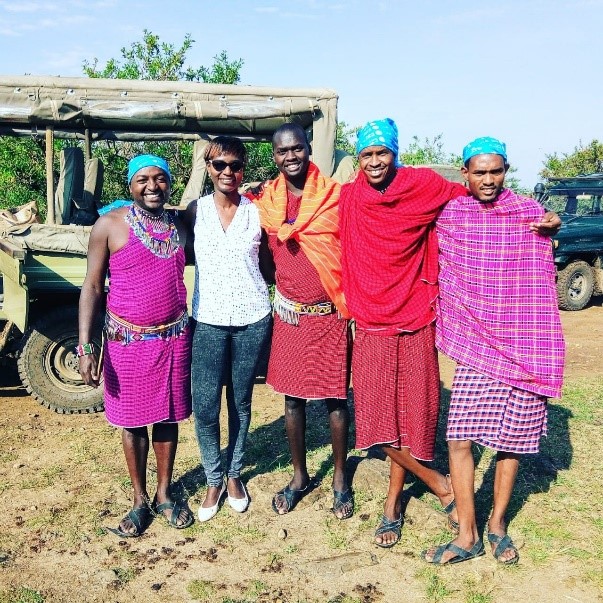Our partner Sustainable Travel & Tourism Agenda (STTA) from Kenya is very actively engaged in the development of sustainable tourism in East Africa despite the crisis. We are impressed by their commitment and are very pleased that STTA is also officially a Preferred Partner of TourCert for East Africa since autumn 2020.
After an ambitious start in 2019, the successful project Tourism Excellence Uganda was abruptly slowed down in 2020 by the global Corona pandemic. This does not stop us from working together to drive the sustainable transformation of tourism.
The following interview with Judy Kepher-Gona, Founder and Principal Consultant of STTA, provides insights into how STTA’s work has been impacted by the Corona pandemic, what the current situation looks like in Kenya as well as other East African countries, and what she hopes for the tourism industry in 2021.
Judy, since autumn 2020, STTA is the official Preferred Partner of TourCert for the East Africa region. What does this partnership mean to you?
This partnership means creating more opportunities for tourism businesses in the East Africa region to learn, grow and become responsible businesses. I see the tools and process embedded in the TourCert approach as key to unlocking scepticism that surrounds certification and an opportunity for many businesses to be qualified. Secondly, we share a lot with TourCert when it comes to certification. We believe in the process, not just the recognition.

At the moment, the Corona pandemic still has a firm grip on tourism worldwide. This must have affected you too, since STTA is offering training and advisory for tourism companies, communities and political decision makers in the planning and implementation of sustainable tourism. How did you fare during the crisis?
We were affected. We had to rethink our face-to-face trainings, our face-to-face mentorship programs with university students and even our annual Sustainable Tourism Africa Summit.
We quickly adapted to online spaces to continue sharing the knowledge around sustainable tourism. We were able to charge for some trainings but also offered a number of free webinars to reassure micro, small and medium enterprises. As a mentorship organisation, it was prudent that we find a way of supporting small businesses to frame the crisis and go through the turbulence phase.
We appreciate all the organisations that invited us to speak in online sessions and to sit as panellists in various online seminars. Overall, we received more than 20 invitations as speakers or panellists.
Whereas there were setbacks, there were also many opportunities for building new networks and to learn for the future.
The crisis persists with some ups and downs for almost one year. What is the current situation of the tourism industry in Kenya and in neighbouring countries like Uganda? How are the people working in tourism doing?
International tourism is in hibernation and there are few international arrivals. The industry is being sustained by domestic tourism. Therefor, tourism in East Africa and Africa as a whole is rethinking the place of domestic tourism. In Kenya, it is also the time when the highest number of tour operators are pursuing sustainable tourism certification. They take advantage of this quiet time to review business operations. This trend concerns me to an extent because it is in busy seasons that true characters of businesses emerge.
Is there any financial support for the industry from the governments? Or other aids?
The government of Kenya had various stimulus packages for conservation and tourism. In the tourism sector, hoteliers were the beneficiaries. They received affordable loans to refurbish. However, in January 2021, the government was concerned that the uptake of the loans was very slow. On the other hand, community conservation areas received grants to pay salaries for community rangers for one year.
I am not aware of any other aid. However, I heard the EU representative, in a webinar hosted by Ministry of tourism and wildlife made some commitments to support tourism.

Why has the tourism industry been hit so bitterly by the Corona pandemic? Is the industry lacking resilience?
Tourism is used to bouncing back in a short time. Until now crisis have been regional, confined to places. The Corona Pandemic is different.
The tourism industry has been hit hard because it is vulnerable in many ways. Tourism is an industry built on many industries. If security fails, tourism suffers. If the weather / climate changes, tourism suffers. If there is a health crisis, tourism is affected. If there is political unrest, tourism is affected. If human rights are violated in a destination, tourism suffers. Yet tourism keeps ignoring the very things that define it. They fail to plan for all external risks.
In Germany, last summer, domestic tourism has been a major trend and was discussed as an instrument to save the industry. What is the significance of domestic tourism in Kenya and neighbouring countries? Can this compensate for loss of income due to a lack of international travellers?
Domestic tourism has sustained the industry in Kenya since the pandemic was declared. State agencies in tourism have often mentioned the significance of tourism in communication and policy. The reality of this significance has been felt in the last few months. In the short term, disparities in revenue between revenue from domestic and international visitors may be significant, but over time, this could be narrowed by increased domestic travel. Nevertheless, the domestic market is not fully tapped.
How can the restart in tourism be successful? What does it take? And what role does sustainability play?
Tourism restart needs transformative leadership and capable institutions (or rethinking existing ones), because tourism needs diversity, inclusivity and lateral growth to unlock its real potential and open new possibilities. Sustainable tourism is about new and different opportunities. It also embodies resilience. Therefor, sustainable tourism must be at the core of restarting tourism.
Below are some of my 2021 quotes that I posted on Social Media for insights on this thinking:
- In 2021, tourism should have the courage to leave the shore (comfort zone) and sail away to more freedom and create new bolder opportunities for travellers, host residents and the planet.
- There is profound knowledge around sustainability to build tourism forward as a responsible industry contributing to inclusive prosperity in destinations and protecting the planet.
- The Covid 19 pandemic brought sustainability in tourism into sharper focus and escalated the vulnerability of small business in tourism in Africa. Restart policies must pay attention to these signals.
- Sustainability opens different possibilities for tourism.
- Many tourism technocrats in Africa are yet to appreciate the value and power of Micro, Small and Medium Enterprises to fuel diversity, inclusiveness and lateral growth of tourism in the continent.
- If the Covid 19 induced “new normal” in tourism does not translate to new possibilities for tourism, then we have not learnt from this crisis.
#buildTourismForward #tourisminsights2021

What are your hopes for tourism in 2021?
That tourism will pursue new possibilities and build resilience through sustainable tourism by rethinking systems that it has dependent on until now.
Thank you, Judy, for sharing your thoughts and plans with us. We all hope for the urgently needed sustainable restart of tourism – in East Africa and worldwide.
Please find more information about the project Tourism Excellence Uganda here.
Tags
Africa, Corona, Kenya, Sustainable tourism, tourism restart


